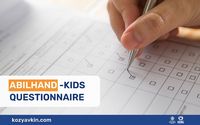It is filled in by the child's parents and assesses the difficulty for the child to perform 21 daily actions with their hands. It takes up to 10 minutes to complete the questionnaire.
The questionnaire was developed in 2004 by a group of Belgian researchers from the Catholic University of Louvain leaded by Carlyne Arnould. The basis for ABILHAND-Kids was the ABILHAND adult questionnaire. The development and calibration of the questionnaire was performed specifically for children with cerebral palsy. ABILHAND-Kids can be used for children with any form and severity of cerebral palsy. The only exclusion criterion is the presence of a significant intellectual deficit (IQ <60).
ABILHAND-Kids tasks can be performed with one or two hands. There are only three tasks that are performed with one hand, such as "taking a coin out of a pocket".
Tasks for two hands, in turn, are divided into three groups.
- The first group (2A) includes tasks that are mostly performed with two hands, but they can be performed with one, divided into stages. An example of a task from the first group is "taking off a T-shirt".
- The second group (2B) is a task that requires fine motor skills of only one hand, while the other hand stabilizes the object. A typical task of the second group is "unscrewing a bottle cap".
- The third group (2C) - tasks that require fine motor skills of both hands, such as "opening a bag of chips." All these tasks differ in complexity and vary from the easiest ("switching on a bedside lamp") to the most difficult ("buttoning up trousers"), but in the form of the questionnaire for parents, they are placed randomly to avoid the impact of systematization.
Each task is assessed as "easy", "difficult" or "impossible". When assigning an assessment, keep in mind that the complexity of the tasks is assessed for the child without any outside or technical assistance. If during the last 3 months the child has never tried to perform one of the tasks, it is not evaluated, and the "?" is put in the form. However, if the parents know that the child is not trying to perform this task because it is too difficult, the assessment is "impossible".
After completing the questionnaire, the answers can be analysed online. You can fill in the questionnaire and receive the results assessment by the link. The result of the analysis is two assessments: logit - the logarithm of the child's chances to complete all tasks of the questionnaire, and the percentage of the maximum possible assessment of the questionnaire. The greater the result, the higher the functionality of the hands. The validity and reliability of ABILHAND-Kids has been tested by numerous scientific studies.
A team of our scientists translated the questionnaire into Ukrainian, performed its cross-cultural adaptation and validation. You can learn more about this process in the article published in the international journal Disability and Rehabilitation.

